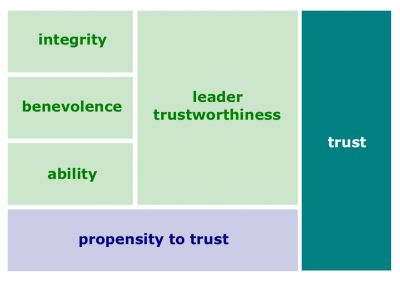Difference between revisions of "Trust"
(Created page with "400px|thumb|right|[[Trust]]Trust is a positive expectation that another will not act opportunistically. For a leader, trust is the belief in the...") |
|||
| Line 1: | Line 1: | ||
[[File:Trust.png|400px|thumb|right|[[Trust]]]][[Trust]] is a positive expectation that another will not act opportunistically. For a [[leader]], [[trust]] is the belief in the integrity, character, and ability to lead. | [[File:Trust.png|400px|thumb|right|[[Trust]]]][[Trust]] is a positive expectation that another will not act opportunistically. For a [[leader]], [[trust]] is the belief in the integrity, character, and ability to lead. | ||
| + | |||
| + | ==Definitions== | ||
| + | According to [[Organizational Behavior by Robbins and Judge (17th edition)]], | ||
| + | :[[Trust]]. A positive expectation that another will not act opportunistically. | ||
==Key concepts== | ==Key concepts== | ||
Revision as of 05:13, 26 November 2018
Trust is a positive expectation that another will not act opportunistically. For a leader, trust is the belief in the integrity, character, and ability to lead.
Definitions
According to Organizational Behavior by Robbins and Judge (17th edition),
- Trust. A positive expectation that another will not act opportunistically.
Key concepts
- Trust propensity. How likely an employee is to trust a leader.
- Identification-based trust. Trust based on a mutual understanding of each other's intentions and appreciation of each other's wants and desires.
